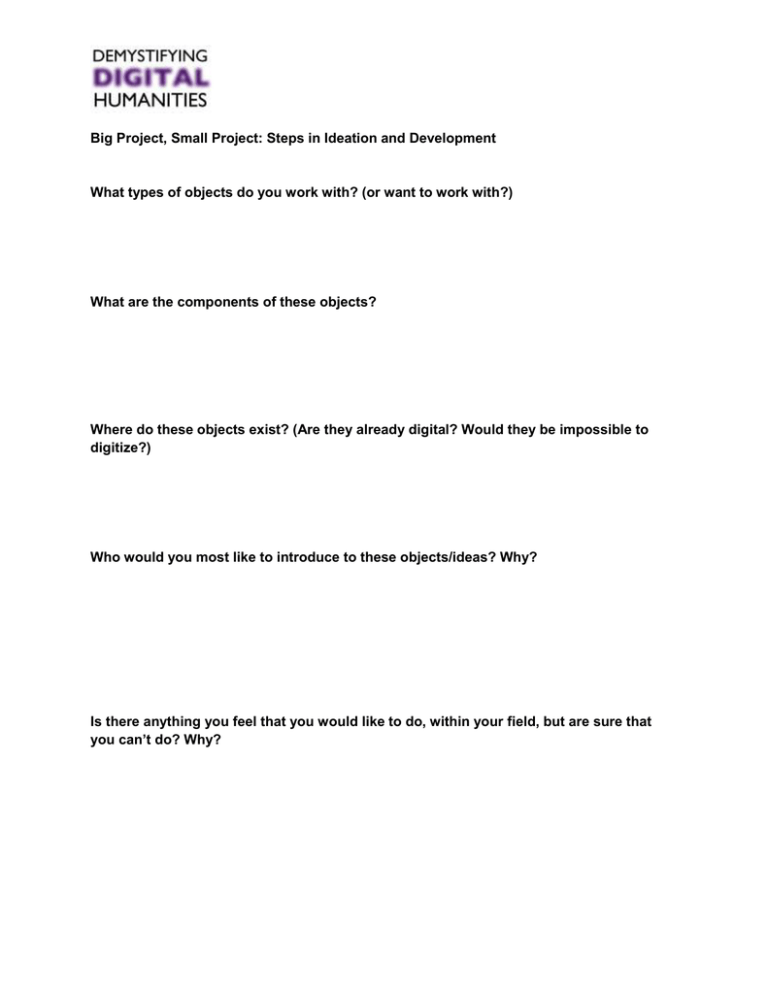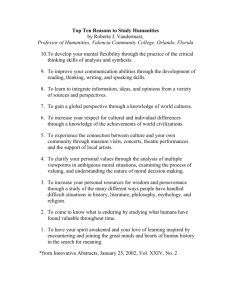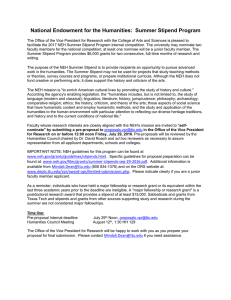Demystifying DH Workshop #5 Handout and Annotated Bibliography
advertisement

Big Project, Small Project: Steps in Ideation and Development What types of objects do you work with? (or want to work with?) What are the components of these objects? Where do these objects exist? (Are they already digital? Would they be impossible to digitize?) Who would you most like to introduce to these objects/ideas? Why? Is there anything you feel that you would like to do, within your field, but are sure that you can’t do? Why? Big Project, Small Project: Steps in Ideation and Development DMDH Workshop #5: Further Reading Visconti, Amanda. Five Tips For Getting Started On A Digital Dissertation. http://www.literaturegeek.com/startingadhdissertation/ Whether you’re working on a digital dissertation or a different sort of project, the recommendations that Amanda Visconti makes highlight vital aspects of good project management communication that are sometimes forgotten in the excitement of having an idea. Golumbia, David. definitions that matter (of “digital humanities”). http://www.uncomputing.org/?p=208 While in the Demystifying workshop series we’ve adopted a relatively positive view of the openness of defining the field, David Golumbia examines how definitions affect funding -- and how the shifts in digital humanities in the last few years have been paralleled by shifts in the types of projects that the NEH Office of Digital Humanities funds. Rhody, Jason. The Boolean Logic of the Digital Humanities. http://mediacommons.futureofthebook.org/question/what-are-differentiations-and-intersectionsmedia-studies-and-digital-humanities/response/b Jason Rhody is the Senior Program Officer at the NEH Office of Digital Humanities -- so, particularly well placed to talk about field definitions. In this article, he provides perspective on what it looks like to view the field based on the multitudinous variety of projects that apply for funding. Morgan, Paige. Today’s adventures in yak shaving: gritty realities of working with code for PhD students. http://www.paigemorgan.net/todays-adventures-in-yak-shaving-gritty-realities-ofworking-with-code-for-phd-students/ While there’s plenty of enthusiasm for DH project development right now, the realities that graduate students face are a bit different from those that faculty and staff deal with. This post provides a rundown of a few of the specifics that I’ve dealt with in the course of working on my own project, Visible Prices. Appleford S, Guiliano J. DevDH.org. 2013. http://devdh.org/ DevDH is a fairly new resource, still in beta (meaning that it’s still being tested out and heavily refined) -- but it already includes a large cache of materials oriented towards providing step-by-step guidance on developing, managing, and publicizing a DH project. These materials are available as podcasts, and as PDFs. Appleford and Guiliano’s resource stands out in that it provides particularly useful questions that might be used to develop an explicit sense of what a project is trying to accomplish. Other Useful Resources: UW Libraries Digital Initiatives: http://www.lib.washington.edu/digital UW-IT: https://www.washington.edu/uwit/






